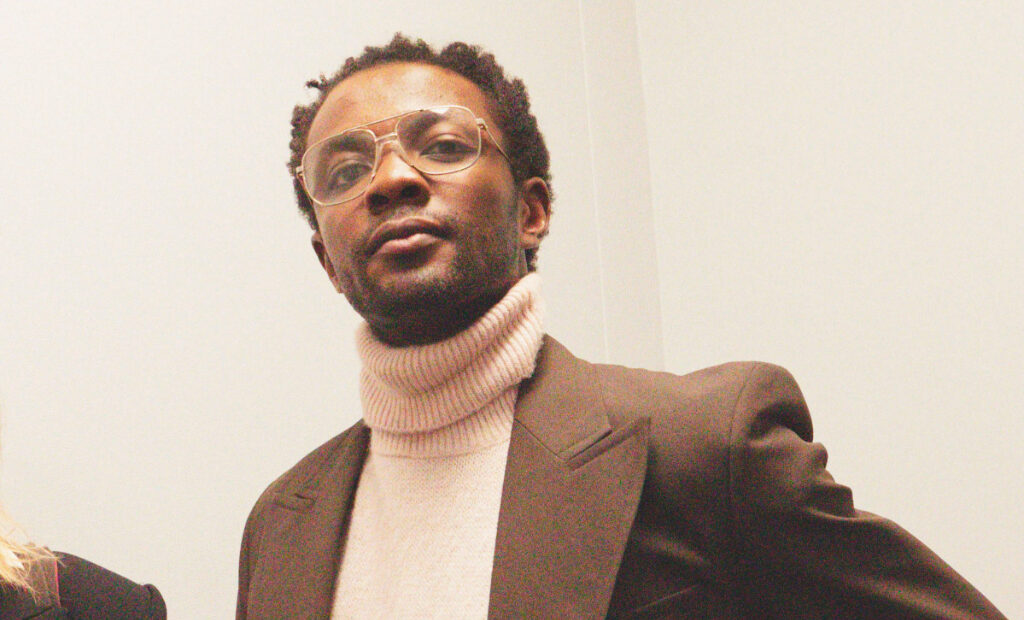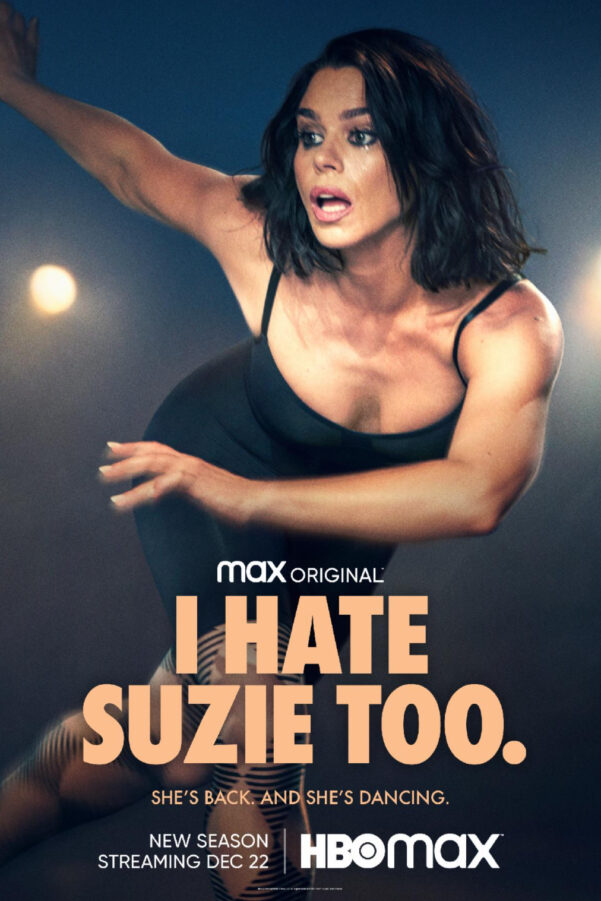“There are so many stomach-falling-out-of-your-arse moments”: Omari Douglas on I Hate Suzie Too

Out this week is the follow-up to the critically acclaimed 2020 hit series I Hate Suzie, the result of yet another blistering collaboration between theatre-turned-TV-writer and producer Lucy Prebble, and the extraordinary pop-star-turned-actress Billie Piper, after Secret Diary of a Call Girl (2007) and The Effect (2012). The blacker-than-coal comedy-drama follows Suzie Pickles, a former teen pop star whose time in the limelight takes an abrupt turn when her phone is hacked and compromising images of her are splashed across the Internet. What ensues – split by chapters into different stages of trauma, akin to the five stages of grief – is equal parts painful to watch and gloriously surgical in its accuracy at pinpointing the ridiculousness of what it means to be a millennial woman in the social media-dominated age.
Now season two is here, I Hate Suzie Too – though it could more aptly be called a Christmas special. The three episodes take as their plot line a self-contained saga where Suzie comes back out of societal Siberia to rekindle her popularity by participating in a dance show, Dance Crazee. The nightmarish qualities of season one are dialled up to 11, with camera angles, single-shot sequences and high-pitched sounds helping to recreate the feeling of acute anxiety in a spectacularly effective fashion, as Suzie once again throws herself at the mercy of the court of public opinion.
Joining the phenomenal cast of season one, Piper as Suzie and Leila Farzad as her long-suffering agent, Naomi, are a fresh set of faces including Douglas Hodge and Blake Harrison as fellow dance contestants, and It’s a Sin and stage star Omari Douglas, who plays her PR agent, Holland Fitz-Henry.
The Upcoming had the pleasure of speaking with Douglas about why he wanted to join the series for the second season, his character and the theatrical elements of the show.
Hi, it’s a real pleasure to talk to you today about this incredible series – both the first season and the second are just such bold, fearless television. From your perspective, what was the appeal? Had you seen the first season?
Those words that you said: it’s bold, it’s fearless, and I think it really was challenging what television can be. And… maybe I’m speaking out of turn here, but there are elements of the show that feel quite theatrical in terms of its form. And the way that it subverts the notions of where the story is going or how you tell a story. So that felt quite theatrical for me. And Lucy and Billie are both theatre babies, so I think maybe that’s where I felt that gleaning from. It was just captivating and totally compelling; I just loved it so, so much. And I love, as we should, these very original, female-centred stories being created by these women. I just adored it – absolutely adored it.
There certainly seems to be a wave – with Michaela Coel’s I May Destroy You, Phoebe Waller-Bridge’s Fleabag and now I Hate Suzie – of television that’s not afraid to show the messiness of being a millennial, and being a woman, rather than portraying women as always pristine, leaning into the flaws of their characters and really pushing the limit of what is shown on screen.
Yeah, exactly. And I feel like this second season ramps that up. She’s a woman in this environment who has all of these expectations in her mind that she feels she needs to meet. And yet she chooses to put herself in another environment, which only ramps those expectations up even more – she chooses to have the public zoom in on her life again. But that’s the viciousness of this sort of circle of being in the industry, which is that, in order to regain some sort of public adoration or trust, she has to put herself through the wringer like that. And so everything just feels so big for her. And watching her do all of that stuff was just incredible.
It must have been strange being a viewer and a fan of the first season to joining the cast! What did it mean to you to be approached for the role? How was it finally seeing that new script from Lucy and Billie?
Honestly, I was so thrilled, I actually couldn’t believe it. I knew they’d had the second season commissioned and I mentioned it to my agent, and then the audition came through. When I auditioned, I met the director, met the team and then it just went from there. I was thrilled to be a part of it – genuinely. I guess it’s not very often that you have a show that moves from season to season; it’s quite surreal to watch something as an audience member and admire it, and then further down the line to then be in it! It was just a total privilege to work with Lucy and Billie. And the rest of the cast were just so brilliant. I was working with some friends who I hadn’t worked with for a good few years, so it was nice to have that reunion with them on it. I honestly just had so much fun. I absolutely loved it so much.
What can you tell us about your character, PR agent Holland? What we will see from him in this season? How did you see him and how did you prepare to play him?
I felt like, on paper, he was someone who was very efficient, young and good at his job. And people were made aware of how good this guy was at his job. But I also felt like that there was this kind of… not veneer, but there was this sort of sheen that felt relatable in terms of us, as a generation of people, as millennials and Gen Zs, navigating public life and culture and media right now. And this notion of: how do you do the right thing when you’re constantly presented with situations where you have to push the line a little bit? And step out of your comfort zone? How do I tell these people that the public have an opinion about the colour of their hair, or the way that they look, or the way that they’re presenting themselves on screen? So it was really interesting playing someone who has to constantly give people such sensitive information, and constantly probe into stuff that is so personal – it’s touching on personal fragility. And: how are you effective at your job? But then, do you go home and feel like you’re being a good person? So I just found that a really interesting feeling to work around, telling these people this really sensitive information and still taking the moral high ground. Navigating all of that stuff – it’s messy, you know?
The show feels incredibly stressful to watch – was it also stressful to make it? There are also a lot of one-shot takes and sequences that must have been really prepped and rehearsed in advance, plus the quick-fire dialogue – some of it hilariously vicious. How do you keep a straight face with lines like that. What was it like being on the set?
I think my favourite thing was those one-shots because it felt like… obviously, it is live when you’re filming it, but it almost felt like being on stage. It was so thrilling, doing those one-shots, because of the pace, and then it allows you to really lean into the urgency of those moments, and running around and sort of trying to keep things in order. Then, with Lucy, there was what she had on paper, and then you’d need to go and put it in this space, and you’d find there might be little moments where there are free spots, so Lucy would sometimes say, “You might need to improv to fill that beat out a little bit”. And so that was really fun. I loved the stress. And I also loved that it was quite meta too, in the sense that I remember saying to Anastasia (who plays Sian) on our first day, “This is really weird that we’re in a studio, filming the show, that is set in the studio”. And so our backstage was the backstage, if that makes sense. It was weird. I’ve just had so much fun.
What was it like seeing Billie perform? Watching the series, it’s hard to imagine how she can disconnect from that at the end of the day – it feels so real, the way she has so aptly captured that feeling of anxiety, where she’s putting up a front, but underneath she’s just completely unravelling.
Yeah. I don’t know; it’s just like watching someone who’s really good at what they do. She had this really admirable quality of just having the reins on what she was trying to do, and collaborating with the people around her to achieve that, because she knew that it wasn’t just about her. She knew it was about multiple departments. It’s incredibly admirable. I just think she’s bloody great. You’re right, she captures the anxiety so well, and it’s just so glorious to watch. It can be in a gesture… I remember finishing a scene where we came out of shot, and then she’s on the phone and she’s stressed out about something – we were watching her in the distance at the end of the corridor and she was just pacing up and down, and she was moving her body in a way that just captured what it is to be so, so anxious and to be in such a high-stakes moment about something. She’s just incredible.
In a sense the series offers a heightened reality: everything feels quite surreal but, ultimately, it’s also grounded. We do have these dance shows in real life, and pop stars and film stars really are thrown into the public eye, with every move they make pored over on social media. It’s a bit like Black Mirror, being very much grounded in reality, but made absurd by taking it to that extra level. What do you think people can take away from watching it?
Yeah, it’s interesting what you were saying about what feels like an absurdity. I feel like the show is capturing what it is like internally to feel that pressure. There are so many stomach-falling-out-of-your-arse moments, that gut-dropping feeling of being in the middle of something huge. I always think of that first episode of the first season, where she throws the phone on the floor when she’s seen what’s on the phone. I feel like she keeps having those moments in this second season. Those moments of: she overcomes one thing, and then there’s another problem that enters the room. It’s like this neverending cycle of crap, and just her having to fight through it, so it feels like a microscope on the interiority of living under that scrutiny 24/7. So, as much as it feels heightened, it reflects what it feels like to be in that moment. Any time something happens to her, it kind of feels apocalyptic – apocalyptic in terms of the form of the show and the way the other elements work with each other to create that feeling. I think that’s what’s so brilliant about the show: they’re not afraid to use lots of different elements to capture the feeling, in the edits and the way it’s shot, rather than just relying on performance alone. That’s why I love doing those one-shot sequences, because it just felt so on the edge.
Sarah Bradbury
I Hate Suzie Too is released on Sky on 20th December 2022. Read our review here.
Watch the trailer for I Hate Suzie Too here:

























Facebook
Twitter
Instagram
YouTube
RSS